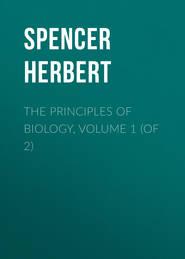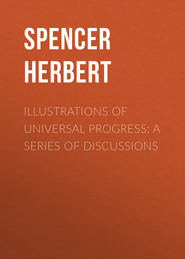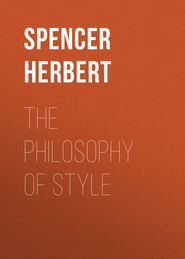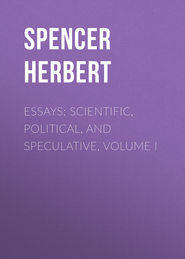По всем вопросам обращайтесь на: info@litportal.ru
(©) 2003-2024.
✖
Essays: Scientific, Political, and Speculative, Volume II
Настройки чтения
Размер шрифта
Высота строк
Поля
Alone on a wide wide sea!
And never a saint took pity on
My soul in agony.”
Of course the principle equally applies when the predicate is a verb or a participle. And as effect is gained by placing first all words indicating the quality, conduct, or condition of the subject, it follows that the copula also should have precedence. It is true, that the general habit of our language resists this arrangement of predicate, copula, and subject; but we may readily find instances of the additional force gained by conforming to it. Thus in the line from “Julius Cæsar” —
“Then burst his mighty heart,”
priority is given to a word embodying both predicate and copula. In a passage contained in Sir W. Scott’s “Marmion,” the like order is systematically employed with great effect:
“The Border slogan rent the sky!
A Home! a Gordon! was the cry;
Loud were the clanging blows;
Advanced, —forced back, —now low, now high,
The pennon sunk and rose;
As bends the bark’s mast in the gale
When rent are rigging, shrouds, and sail,
It waver’d ’mid the foes.”
Pursuing the principle further, it is obvious that for producing the greatest effect, not only should the main divisions of a sentence observe this sequence, but the sub-divisions of these should have their parts similarly arranged. In nearly all cases, the predicate is accompanied by some limit or qualification called its complement. Commonly, also, the circumstances of the subject, which form its complement, have to be specified. And as these qualifications and circumstances must determine the mode in which the acts and things they belong to are conceived, precedence should be given to them. Lord Kaimes notices the fact that this order is preferable; though without giving the reason. He says: – “When a circumstance is placed at the beginning of the period, or near the beginning, the transition from it to the principal subject is agreeable: is like ascending or going upward.” A sentence arranged in illustration of this will be desirable. Here is one:
– Whatever it may be in theory, it is clear that in practice the French idea of liberty is – the right of every man to be master of the rest.
In this case, were the first two clauses, up to the word “practice” inclusive, which qualify the subject, to be placed at the end instead of the beginning, much of the force would be lost; as thus:
– The French idea of liberty is – the right of every man to be master of the rest; in practice at least, if not in theory.
Similarly with respect to the conditions under which any fact is predicated. Observe in the following example the effect of putting them last:
– How immense would be the stimulus to progress, were the honour now given to wealth and title given exclusively to high achievements and intrinsic worth!
And then observe the superior effect of putting them first:
– Were the honour now given to wealth and title given exclusively to high achievements and intrinsic worth, how immense would be the stimulus to progress!
The effect of giving priority to the complement of the predicate, as well as the predicate itself, is finely displayed in the opening of “Hyperion:”
“Deep in the shady sadness of a vale
Far sunken from the healthy breath of morn,
Far from the fiery noon, and eve’s one star,
Sat grey-haired Saturn, quiet as a stone.”
Here we see, not only that the predicate “sat” precedes the subject “Saturn,” and that the three lines in italics, constituting the complement of the predicate, come before it; but that in the structure of this complement also, the same order is followed: each line being so composed that the qualifying words are placed before the words suggesting concrete images.
The right succession of the principal and subordinate propositions in a sentence depends on the same law. Regard for economy of the recipient’s attention, which, as we find, determines the best order for the subject, copula, predicate, and their complements, dictates that the subordinate proposition shall precede the principal one, when the sentence includes two. Containing, as the subordinate proposition does, some qualifying or explanatory idea, its priority prevents misconception of the principal one; and therefore saves the mental effort needed to correct such misconception. This will be seen in the annexed example.
– The secrecy once maintained in respect to the parliamentary debates, is still thought needful in diplomacy; and diplomacy being secret, England may any day be unawares betrayed by its ministers into a war costing a hundred thousand lives, and hundreds of millions of treasure: yet the English pique themselves on being a self-governed people.
The two subordinate propositions, ending with the semicolon and colon respectively, almost wholly determine the meaning of the principal proposition with which the sentence concludes; and the effect would be lost were they placed last instead of first.
From this general principle of right arrangement may also be inferred the proper order of those minor divisions into which the major divisions of sentences may be decomposed. In every sentence of any complexity the complement to the subject contains several clauses, and that to the predicate several others; and these may be arranged in greater or less conformity to the law of easy apprehension. Of course with these, as with the larger members, the succession should be from the less specific to the more specific – from the abstract to the concrete.
Now however we must notice a further condition to be fulfilled in the proper construction of a sentence; but still a condition dictated by the same general principle with the other: the condition, namely, that the words or the expressions which refer to the most nearly connected thoughts shall be brought the closest together. Evidently the single words, the minor clauses, and the leading divisions of every proposition, severally qualify each other. The longer the time that elapses between the mention of any qualifying member and the member qualified, the longer must the mind be exerted in carrying forward the qualifying member ready for use. And the more numerous the qualifications to be simultaneously remembered and rightly applied, the greater will be the mental power expended, and the smaller the effect produced. Hence, other things equal, force will be gained by so arranging the members of a sentence that these suspensions shall at any moment be the fewest in number; and shall also be of the shortest duration. The following is an instance of defective combination.
– A modern newspaper-statement, though probably true, would be laughed at, if quoted in a book as testimony; but the letter of a court gossip is thought good historical evidence, if written some centuries ago.
A re-arrangement of this, in accordance with the principle indicated above, will be found to increase the effect. Thus:
– Though probably true, a modern newspaper-statement quoted in a book as testimony, would be laughed at; but the letter of a court gossip, if written some centuries ago, is thought good historical evidence.
By making this change, some of the suspensions are avoided and others shortened; while there is less liability to produce premature conceptions. The passage quoted below from “Paradise Lost” affords a fine instance of a sentence well arranged; alike in the priority of the subordinate members, in the avoidance of long and numerous suspensions, and in the correspondence between the sequence of the clauses and the sequence of the phenomena described, which, by the way, is a further prerequisite to easy apprehension, and therefore to effect.
“As when a prowling wolf,
Whom hunger drives to seek new haunt for prey,
Watching where shepherds pen their flocks at eve,
In hurdled cotes amid the field secure,
Leaps o’er the fence with ease into the fold:
Or as a thief, bent to unhoard the cash
Of some rich burgher, whose substantial doors,
Cross-barr’d and bolted fast, fear no assault,
In at the window climbs, or o’er the tiles:
So clomb the first grand Thief into God’s fold;
So since into his Church lewd hirelings climb.”
The habitual use of sentences in which all or most of the descriptive and limiting elements precede those described and limited, gives rise to what is called the inverted style: a title which is, however, by no means confined to this structure, but is often used where the order of the words is simply unusual. A more appropriate title would be the direct style , as contrasted with the other, or indirect style: the peculiarity of the one being, that it conveys each thought step by step with little liability to error; and of the other, that it conveys each thought by a series of approximations, which successively correct the erroneous preconceptions that have been raised.
The superiority of the direct over the indirect form of sentence, implied by the several conclusions above drawn, must not, however, be affirmed without reservation. Though, up to a certain point, it is well for the qualifying clauses of a proposition to precede those qualified; yet, as carrying forward each qualifying clause costs some mental effort, it follows that when the number of them and the time they are carried become great, we reach a limit beyond which more is lost than is gained. Other things equal, the arrangement should be such that no concrete image shall be suggested until the materials out of which it is to be framed have been presented. And yet, as lately pointed out, other things equal, the fewer the materials to be held at once, and the shorter the distance they have to be borne, the better. Hence in some cases it becomes a question whether most mental effort will be entailed by the many and long suspensions, or by the correction of successive misconceptions.
This question may sometimes be decided by considering the capacity of the persons addressed. A greater grasp of mind is required for the ready apprehension of thoughts expressed in the direct manner, where the sentences are anywise intricate. To recollect a number of preliminaries stated in elucidation of a coming idea, and to apply them all to the formation of it when suggested, demands a good memory and considerable power of concentration. To one possessing these, the direct method will mostly seem the best; while to one deficient in them it will seem the worst. Just as it may cost a strong man less effort to carry a hundred-weight from place to place at once, than by a stone at a time; so, to an active mind it may be easier to bear along all the qualifications of an idea and at once rightly form it when named, than to first imperfectly conceive such idea, and then carry back to it, one by one, the details and limitations afterwards mentioned. While conversely, as for a boy the only possible mode of transferring a hundred-weight, is that of taking it in portions; so, for a weak mind, the only possible mode of forming a compound conception may be that of building it up by carrying separately its several parts.
That the indirect method – the method of conveying the meaning by a series of approximations – is best fitted for the uncultivated, may indeed be inferred from their habitual use of it. The form of expression adopted by the savage, as in – “Water, give me,” is the simplest type of this arrangement. In pleonasms, which are comparatively prevalent among the uneducated, the same essential structure is seen; as, for instance in – “The men, they were there.” Again, the old possessive case – “The king, his crown,” conforms to the like order of thought. Moreover, the fact that the indirect mode is called the natural one, implies that it is the one spontaneously employed by the common people; that is – the one easiest for undisciplined minds.
There are many cases, however, in which neither the direct nor the indirect mode is the best; but in which an intermediate mode is preferable to both. When the number of circumstances and qualifications to be included in the sentence is great, the judicious course is neither to enumerate them all before introducing the idea to which they belong, nor to put this idea first and let it be remodelled to agree with the particulars afterwards mentioned; but to do a little of each. It is desirable to avoid so extremely indirect an arrangement as the following: —
– “We came to our journey’s end, at last, with no small difficulty, after much fatigue, through deep roads, and bad weather.”
Yet to transform this into an entirely direct sentence would be unadvisable; as witness: —
– At last, with no small difficulty, after much fatigue, through deep roads, and bad weather, we came to our journey’s end.
Dr. Whately, from whom we quote the first of these two arrangements, proposes this construction: —
– “At last, after much fatigue, through deep roads and bad weather, we came, with no small difficulty, to our journey’s end.”
Here by introducing the words “we came” a little earlier in the sentence, the labour of carrying forward so many particulars is diminished, and the subsequent qualification “with no small difficulty” entails an addition to the thought that is easily made. But a further improvement may be effected by putting the words “we came” still earlier; especially if at the same time the qualifications be rearranged in conformity with the principle already explained, that the more abstract elements of the thought should come before the more concrete. Observe the result of making these two changes:
– At last, with no small difficulty, and after much fatigue, we came, through deep roads and bad weather, to our journey’s end.
This reads with comparative smoothness; that is – with less hindrance from suspensions and reconstructions of thought.
And never a saint took pity on
My soul in agony.”
Of course the principle equally applies when the predicate is a verb or a participle. And as effect is gained by placing first all words indicating the quality, conduct, or condition of the subject, it follows that the copula also should have precedence. It is true, that the general habit of our language resists this arrangement of predicate, copula, and subject; but we may readily find instances of the additional force gained by conforming to it. Thus in the line from “Julius Cæsar” —
“Then burst his mighty heart,”
priority is given to a word embodying both predicate and copula. In a passage contained in Sir W. Scott’s “Marmion,” the like order is systematically employed with great effect:
“The Border slogan rent the sky!
A Home! a Gordon! was the cry;
Loud were the clanging blows;
Advanced, —forced back, —now low, now high,
The pennon sunk and rose;
As bends the bark’s mast in the gale
When rent are rigging, shrouds, and sail,
It waver’d ’mid the foes.”
Pursuing the principle further, it is obvious that for producing the greatest effect, not only should the main divisions of a sentence observe this sequence, but the sub-divisions of these should have their parts similarly arranged. In nearly all cases, the predicate is accompanied by some limit or qualification called its complement. Commonly, also, the circumstances of the subject, which form its complement, have to be specified. And as these qualifications and circumstances must determine the mode in which the acts and things they belong to are conceived, precedence should be given to them. Lord Kaimes notices the fact that this order is preferable; though without giving the reason. He says: – “When a circumstance is placed at the beginning of the period, or near the beginning, the transition from it to the principal subject is agreeable: is like ascending or going upward.” A sentence arranged in illustration of this will be desirable. Here is one:
– Whatever it may be in theory, it is clear that in practice the French idea of liberty is – the right of every man to be master of the rest.
In this case, were the first two clauses, up to the word “practice” inclusive, which qualify the subject, to be placed at the end instead of the beginning, much of the force would be lost; as thus:
– The French idea of liberty is – the right of every man to be master of the rest; in practice at least, if not in theory.
Similarly with respect to the conditions under which any fact is predicated. Observe in the following example the effect of putting them last:
– How immense would be the stimulus to progress, were the honour now given to wealth and title given exclusively to high achievements and intrinsic worth!
And then observe the superior effect of putting them first:
– Were the honour now given to wealth and title given exclusively to high achievements and intrinsic worth, how immense would be the stimulus to progress!
The effect of giving priority to the complement of the predicate, as well as the predicate itself, is finely displayed in the opening of “Hyperion:”
“Deep in the shady sadness of a vale
Far sunken from the healthy breath of morn,
Far from the fiery noon, and eve’s one star,
Sat grey-haired Saturn, quiet as a stone.”
Here we see, not only that the predicate “sat” precedes the subject “Saturn,” and that the three lines in italics, constituting the complement of the predicate, come before it; but that in the structure of this complement also, the same order is followed: each line being so composed that the qualifying words are placed before the words suggesting concrete images.
The right succession of the principal and subordinate propositions in a sentence depends on the same law. Regard for economy of the recipient’s attention, which, as we find, determines the best order for the subject, copula, predicate, and their complements, dictates that the subordinate proposition shall precede the principal one, when the sentence includes two. Containing, as the subordinate proposition does, some qualifying or explanatory idea, its priority prevents misconception of the principal one; and therefore saves the mental effort needed to correct such misconception. This will be seen in the annexed example.
– The secrecy once maintained in respect to the parliamentary debates, is still thought needful in diplomacy; and diplomacy being secret, England may any day be unawares betrayed by its ministers into a war costing a hundred thousand lives, and hundreds of millions of treasure: yet the English pique themselves on being a self-governed people.
The two subordinate propositions, ending with the semicolon and colon respectively, almost wholly determine the meaning of the principal proposition with which the sentence concludes; and the effect would be lost were they placed last instead of first.
From this general principle of right arrangement may also be inferred the proper order of those minor divisions into which the major divisions of sentences may be decomposed. In every sentence of any complexity the complement to the subject contains several clauses, and that to the predicate several others; and these may be arranged in greater or less conformity to the law of easy apprehension. Of course with these, as with the larger members, the succession should be from the less specific to the more specific – from the abstract to the concrete.
Now however we must notice a further condition to be fulfilled in the proper construction of a sentence; but still a condition dictated by the same general principle with the other: the condition, namely, that the words or the expressions which refer to the most nearly connected thoughts shall be brought the closest together. Evidently the single words, the minor clauses, and the leading divisions of every proposition, severally qualify each other. The longer the time that elapses between the mention of any qualifying member and the member qualified, the longer must the mind be exerted in carrying forward the qualifying member ready for use. And the more numerous the qualifications to be simultaneously remembered and rightly applied, the greater will be the mental power expended, and the smaller the effect produced. Hence, other things equal, force will be gained by so arranging the members of a sentence that these suspensions shall at any moment be the fewest in number; and shall also be of the shortest duration. The following is an instance of defective combination.
– A modern newspaper-statement, though probably true, would be laughed at, if quoted in a book as testimony; but the letter of a court gossip is thought good historical evidence, if written some centuries ago.
A re-arrangement of this, in accordance with the principle indicated above, will be found to increase the effect. Thus:
– Though probably true, a modern newspaper-statement quoted in a book as testimony, would be laughed at; but the letter of a court gossip, if written some centuries ago, is thought good historical evidence.
By making this change, some of the suspensions are avoided and others shortened; while there is less liability to produce premature conceptions. The passage quoted below from “Paradise Lost” affords a fine instance of a sentence well arranged; alike in the priority of the subordinate members, in the avoidance of long and numerous suspensions, and in the correspondence between the sequence of the clauses and the sequence of the phenomena described, which, by the way, is a further prerequisite to easy apprehension, and therefore to effect.
“As when a prowling wolf,
Whom hunger drives to seek new haunt for prey,
Watching where shepherds pen their flocks at eve,
In hurdled cotes amid the field secure,
Leaps o’er the fence with ease into the fold:
Or as a thief, bent to unhoard the cash
Of some rich burgher, whose substantial doors,
Cross-barr’d and bolted fast, fear no assault,
In at the window climbs, or o’er the tiles:
So clomb the first grand Thief into God’s fold;
So since into his Church lewd hirelings climb.”
The habitual use of sentences in which all or most of the descriptive and limiting elements precede those described and limited, gives rise to what is called the inverted style: a title which is, however, by no means confined to this structure, but is often used where the order of the words is simply unusual. A more appropriate title would be the direct style , as contrasted with the other, or indirect style: the peculiarity of the one being, that it conveys each thought step by step with little liability to error; and of the other, that it conveys each thought by a series of approximations, which successively correct the erroneous preconceptions that have been raised.
The superiority of the direct over the indirect form of sentence, implied by the several conclusions above drawn, must not, however, be affirmed without reservation. Though, up to a certain point, it is well for the qualifying clauses of a proposition to precede those qualified; yet, as carrying forward each qualifying clause costs some mental effort, it follows that when the number of them and the time they are carried become great, we reach a limit beyond which more is lost than is gained. Other things equal, the arrangement should be such that no concrete image shall be suggested until the materials out of which it is to be framed have been presented. And yet, as lately pointed out, other things equal, the fewer the materials to be held at once, and the shorter the distance they have to be borne, the better. Hence in some cases it becomes a question whether most mental effort will be entailed by the many and long suspensions, or by the correction of successive misconceptions.
This question may sometimes be decided by considering the capacity of the persons addressed. A greater grasp of mind is required for the ready apprehension of thoughts expressed in the direct manner, where the sentences are anywise intricate. To recollect a number of preliminaries stated in elucidation of a coming idea, and to apply them all to the formation of it when suggested, demands a good memory and considerable power of concentration. To one possessing these, the direct method will mostly seem the best; while to one deficient in them it will seem the worst. Just as it may cost a strong man less effort to carry a hundred-weight from place to place at once, than by a stone at a time; so, to an active mind it may be easier to bear along all the qualifications of an idea and at once rightly form it when named, than to first imperfectly conceive such idea, and then carry back to it, one by one, the details and limitations afterwards mentioned. While conversely, as for a boy the only possible mode of transferring a hundred-weight, is that of taking it in portions; so, for a weak mind, the only possible mode of forming a compound conception may be that of building it up by carrying separately its several parts.
That the indirect method – the method of conveying the meaning by a series of approximations – is best fitted for the uncultivated, may indeed be inferred from their habitual use of it. The form of expression adopted by the savage, as in – “Water, give me,” is the simplest type of this arrangement. In pleonasms, which are comparatively prevalent among the uneducated, the same essential structure is seen; as, for instance in – “The men, they were there.” Again, the old possessive case – “The king, his crown,” conforms to the like order of thought. Moreover, the fact that the indirect mode is called the natural one, implies that it is the one spontaneously employed by the common people; that is – the one easiest for undisciplined minds.
There are many cases, however, in which neither the direct nor the indirect mode is the best; but in which an intermediate mode is preferable to both. When the number of circumstances and qualifications to be included in the sentence is great, the judicious course is neither to enumerate them all before introducing the idea to which they belong, nor to put this idea first and let it be remodelled to agree with the particulars afterwards mentioned; but to do a little of each. It is desirable to avoid so extremely indirect an arrangement as the following: —
– “We came to our journey’s end, at last, with no small difficulty, after much fatigue, through deep roads, and bad weather.”
Yet to transform this into an entirely direct sentence would be unadvisable; as witness: —
– At last, with no small difficulty, after much fatigue, through deep roads, and bad weather, we came to our journey’s end.
Dr. Whately, from whom we quote the first of these two arrangements, proposes this construction: —
– “At last, after much fatigue, through deep roads and bad weather, we came, with no small difficulty, to our journey’s end.”
Here by introducing the words “we came” a little earlier in the sentence, the labour of carrying forward so many particulars is diminished, and the subsequent qualification “with no small difficulty” entails an addition to the thought that is easily made. But a further improvement may be effected by putting the words “we came” still earlier; especially if at the same time the qualifications be rearranged in conformity with the principle already explained, that the more abstract elements of the thought should come before the more concrete. Observe the result of making these two changes:
– At last, with no small difficulty, and after much fatigue, we came, through deep roads and bad weather, to our journey’s end.
This reads with comparative smoothness; that is – with less hindrance from suspensions and reconstructions of thought.











